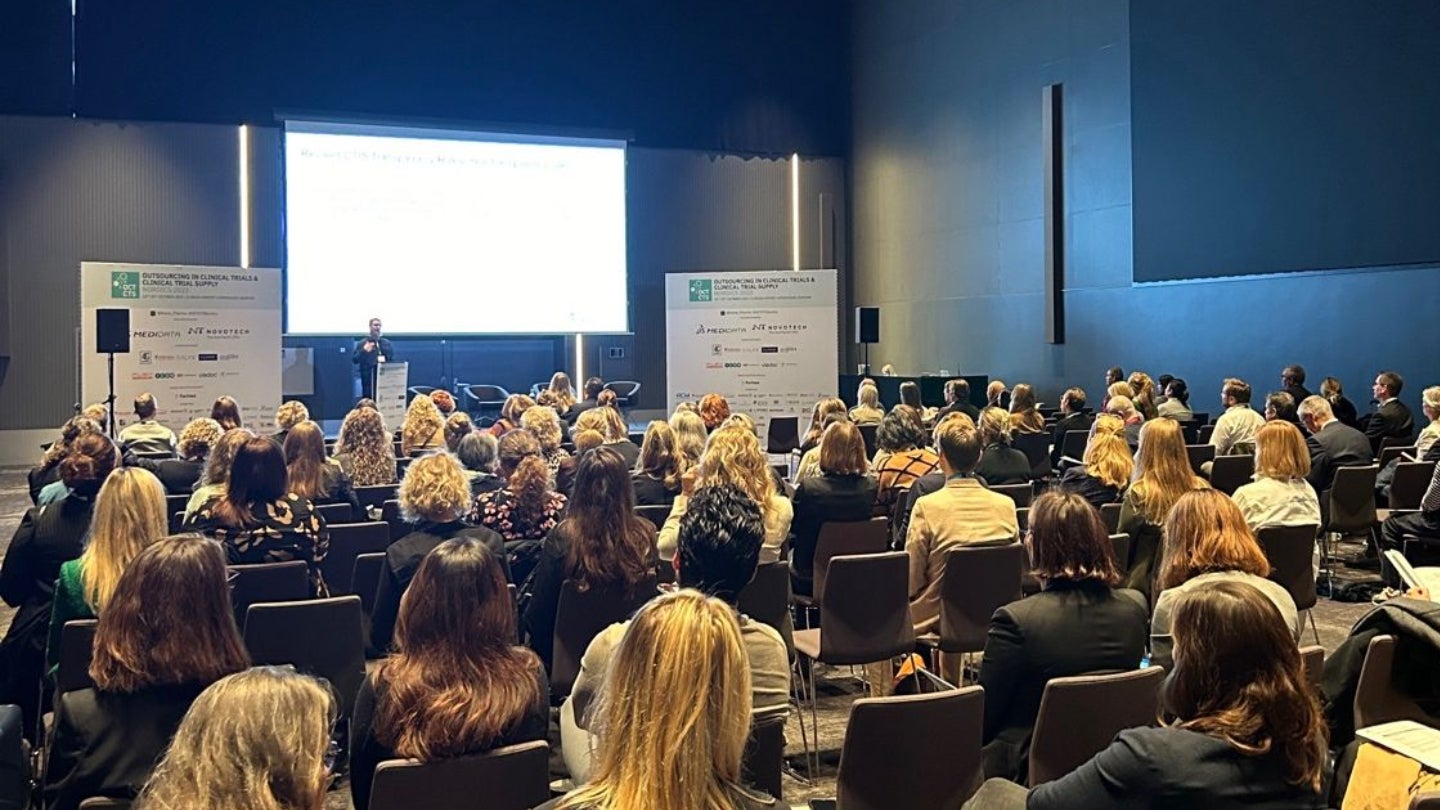
Overarching themes of responsibility, transparency and accountability in the relationship between contract research organisations (CROs) and sponsors ran through many of the presentations at the 11th Annual Outsourcing in Clinical Trials Nordics meeting in Copenhagen in October.
As one speaker at the meeting put it, ‘Nobody has found the solution for outsourcing, there are no plug-and-play methods.’

Discover B2B Marketing That Performs
Combine business intelligence and editorial excellence to reach engaged professionals across 36 leading media platforms.
Taking over the Clarion Hotel & Congress on the 24 & 25 of October, the conference played host to a myriad of representatives from sponsor organisations and CROs and was carried out alongside the 11th Annual Clinical Trial supply meeting at the same time.
Since the onset of the Covid-19 pandemic in 2019, the number of CROs in the general market has somewhat shrunk due to a significant number of mergers and acquisitions throughout 2021. This has presented a concern for the average sponsor, limiting choice and forcing wariness when it comes to selecting the right CRO.
GlobalData research found that in 2021 as many as 50 CROs were part of a completed merger and acquisition. Similarly, there were 29 mergers in 2020 and 18 in 2019, making the pandemic period a busy time for market consolidation.
Taking responsibility
It’s no wonder then that responsibility and owning mistakes took central focus at the first day’s panel discussion on what sponsors really want from their relationship with a CRO.

US Tariffs are shifting - will you react or anticipate?
Don’t let policy changes catch you off guard. Stay proactive with real-time data and expert analysis.
By GlobalDataTitled ‘Reversing the conversation – what the clinical trial industry really wants from its service providers,’ it was hosted by representatives from pharmaceutical firms Camurus, Zealand Pharma and Leo Pharma, the discussion saw a Q&A from an audience anxious to learn how some companies work with CROs to ensure they are transparent and accountable.
Principal data manager for the biotech Zealand Pharma, Ane Jensen said, “What I realised when I moved from a big pharma firm where a lot of things were done in-house, to a fully outsourced setting, I had a realisation that if certain trials fail, we could potentially stop existing. But the CRO could go on. So, my focus is to work with one that is very accountable and very knowledgeable.
“I want them to take us seriously because this is a very serious business to us.”
The high number of mergers and acquisitions among CROs over the past four years means that many of them now comprise a significant number of staff across several sites who occasionally end up blaming one another when a clinical trial falls short of its deadlines.
The panelists broached different methods of holding CROs to account such as placing penalties on CROs who fail to meet deadlines, but also noted that doing this could make a CRO far less inclined to work with a sponsor.
All the panellists were posed the question “If you are not happy with one of the big CROs, how much flexibility do you have to just not work with them again?”
Camurus’ clinical programme director, Lisa Hellstrom said: “I know that it can be a bit cumbersome, but we need CROs. We need their expertise. But I understand that they are big organisations who see delays, it’s not possible for small companies to do all the communications with all the sites ourselves.”
However, the panel did hit on the fact that some CROs employ site managers who act as a singular point of contact for sponsors, as opposed to numerous managers at various sites, allowing for a much more streamlined process in terms of management.

Don’t let the patients lose out
On the opposite side of the spectrum, the founder of one German CRO took to the stage for her presentation titled: “Accelerated performance of complex exploratory patient studies: Practical insights from the investigational site,” in which she urged sponsors not to let past experience and bureaucracy impact the patients in their trials.
Claudia Hesselmann, CEO of Arencia, told sponsors in the audience not to allow convenience and reliance on historical data to impede early-stage trials.
She also called on sponsors to ensure that patients had everything they needed to feel comfortable and included in the whole process and urged that all trial participants should be paid for their time, even those in oncology trials who traditionally would not have been.
Hesselmann said: “What many people forget is that patients have their fears, they have their families. Patients are our partners in doing research. In early research, there is no proven benefit for the patient. That’s why we must have an environment that puts them in the centre.
“Of course, we also compensate our patients, even oncology patients. Sometimes I get feedback from sponsors saying that they don’t compensate oncology patients, implying that they are so ill that they don’t have a choice. That’s not okay. An oncology patient is equal to a healthy volunteer.”
She also urged sponsors not to allow complacency with regulatory systems in one region to cause a trial to decelerate as she elaborated on how one of the biggest challenges for Arencia is not recruitment or even the complexity of the studies but is bureaucracy it faces in the back and forth between sponsor, regulator and CRO.
On the supply side
Over at the Clinical Trial Supply track the shadow of Covid-19 loomed large over proceedings, especially during a talk on virtual clinics by the director of therapy research & analysis in medical devices for GlobalData, Andrew Thompson.
Since 2019, the amount of virtual clinical trials has quadrupled with initial figures more than doubling in the first year of the Covid-19 pandemic.
GlobalData research found that around 80% of clinical trials fail to meet their enrolment deadlines. It also showed that for every day of delay, there could be an average costs per trial of $8m.
Thompson said: “Some of the challenges when conducting new virtual trials are to do with new technology as well as regulatory issues. There are differing regulatory guidelines in each region, in Europe GDPR can present a problem, but in other countries such as the US and China, there are different frameworks.
“But also when you start using digital data you also introduce more commercial concerns, like commercial confidential data. There is also the high initial set up costs of setting up clinical software and devices.”
Thompson detailed how virtual clinical trials can be reworked in certain ways to make gaining eConsent from trial participants more engaging and better ensure that they understand their rights and what the trial entails to curb patient dropout.
The presentation also showed how the majority of VCTs have been occurring in the field of medical devices, with a significant majority of those taking place in Europe or North America and 34% of these centering around wearable technology.
Thompson added: “VCT’s are here to stay. Every major pandemic in history has left some kind of major mark on the healthcare system. With polio, we saw the creation of the intensive care unit. Following Covid-19 I think we will see that the clinical trials landscape has been permanently changed and that virtual clinical trials will be here going forward.”





